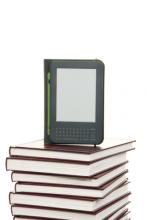e-book

I’VE BEEN thinking a lot lately about technological obsolescence. This isn’t because I’m a classroom teacher and professional writer—two occupations widely expected to meet the fate of John Henry. My musings have mainly been prompted by the hours I just spent weeding through my family’s extensive collection of cassette tapes. From 1992 to about 2005, my wife, Polly, and I made a sizeable investment in that doomed medium, mostly in the form of children’s audiobooks and home-school educational programs that our kids (now ages 14 to 21) have outgrown. We still have three functioning cassette players in our house, but then we still have a 22-year-old tube television, too. I don’t expect that anyone who has young children today would be willing to take on our collection of cassettes. Even Goodwill may refuse them.
Some things, like the cassette tape, deserve to become obsolete. They were always an inferior product. But, all the logic of the market economy to the contrary, newer is not always, or even usually, better.
That’s why it’s been heartening to witness, in the past year or so, the beginning of a small backlash against our forced march toward a future that is all-digital, all the time. The first sign of a revolt was the return of the vinyl record. Of course, I held on to my vinyl through all the transitions of the past 30 years, and we’ve always had a functioning turntable in the house. But now it is my 21-year-old son who actually buys vinyl. Of course, my son also has an iPod and does most of his listening through headphones, like the rest of his peers. But he and thousands of other young music buffs have learned that vinyl delivers a better sound than any of the digital formats currently on the consumer market.

Last year, Gideons International distributed more than 84 million printed copies of the Bible around the world to students, hospitals, members of the military and, of course, hotels, where they are a ubiquitous sight in bedside tables.
Starting this month, however, the InterContinental Hotels Group is modernizing that mission at one of its hotels, replacing the paper tomes with electronic versions of the Bible loaded on Kindle e-readers. Each of the 148 rooms at the chain's Hotel Indigo in Newcastle, England, will be outfitted with a Kindle Touch with Wi-Fi. Guests can use the e-ink devices to catch up on scripture, as well as purchase and read any other books available in the Amazon Kindle store.
Apparently the Gideons are supportive of the hotel group's move toward electronic versions of Holy Writ. (And if a guest is so taken with the Kindle that they take it with them when they check out, the hotel will charge the guest's credit card for the Kindle.)
Read the entire CNN.com report HERE.